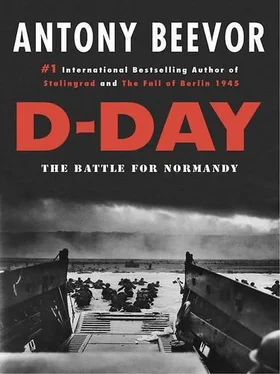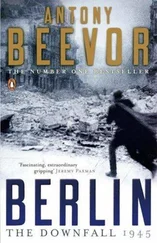Now that the great decision had been taken, Eisenhower went to South Parade Pier in Portsmouth to see the last troops embarking. ‘He always gets a lift from talking with soldiers,’ his aide, Harry Butcher, noted in his diary. At lunchtime, they returned to Eisenhower’s trailer at Southwick Park and played ‘Hounds and Fox’ and then checkers. Butcher had already arranged for the supreme commander, accompanied by journalists, to go to the airfield at Greenham Common that evening to visit the American 101st Airborne Division. They were due to take off at 23.00 hours for the mission which Leigh-Mallory had predicted would be a disaster.
Unlike the infantry and other arms, who had been enclosed in the barbed-wire ‘sausages’, the airborne troops had been driven directly to the airfields from where they were to take off. The 82nd Airborne Division had been based around Nottingham, while the 101st was spread around the Home Counties west of London. For five days they had been quartered in aircraft hangars and provided with rows of cots with aisles in between. There, they stripped and oiled their personal weapons time and again, or sharpened their bayonets. Some had bought commando knives in London, and several had equipped themselves with cut-throat razors. They had been instructed how to kill a man silently by slicing through the jugular and the voice box. Their airborne training had not only been physically rigorous. Some of them had been forced ‘to crawl through the entrails and blood of hogs as part of getting toughened up’.
To take their minds off the oppressive wait extended by the postponement, officers provided gramophones which played songs such as ‘I’ll Walk Alone’ and ‘That Old Black Magic’. They also organized projectors to show movies, especially ones starring Bob Hope. Many paratroopers had also been listening to ‘Axis Sally’ [2] ‘Axis Sally’ was the name given by the US forces to Mildred Gillars (1900-1988), a failed American actress originally from Portland, Maine, who had moved to Germany in 1935 and become an announcer on Radio Berlin. She broadcast music as well as Nazi propaganda designed to undermine Allied morale. She was tried for treason in 1949 and served twelve years in prison.
on Radio Berlin, who played good music as well as transmitting vicious propaganda on the programme Home Sweet Home . Yet even when she said on repeated occasions before D-Day that the Germans were waiting for them, most regarded it as a joke.
There were also Red Cross doughnut and coffee stands run by young American women volunteers. In many cases they slipped soldiers their own cigarette ration. The food provided, including steak, chips and ice cream, was a luxury which inevitably prompted more black jokes about being fattened up for the kill. The 82nd Airborne had acquired a taste for fish and chips in the Nottingham area as well as many local friendships. They too had been touched by the population rushing out to wave them off, many of them in tears, as convoys of trucks drove the paratroopers to their airfields.
A large number of men took their minds off what lay ahead with frenetic gambling, first with the dubious-looking invasion money and then with saved dollars and pound notes. They were shooting dice and playing blackjack. One man who had won $2,500, a very considerable sum in those days, deliberately played on until he lost the lot. He sensed that if he walked away with the money, the fates would decree his death.
Paratroopers looked over their main chutes and reserves to make sure that they were in perfect order. Others wrote last letters home to families or girlfriends in case of their death. Sometimes precious photographs were taken from their wallet and taped on the inside of their helmet. All personal papers and civilian effects were collected up and packed to be held until their return. Chaplains held church services in a corner of the hangar and Catholics took confession.
In this time for individual reflection, no greater contrast could have come than from some of the regimental commanders’ pep talks. Colonel ‘Jump’ Johnson, who led the 501st Parachute Infantry Regiment, drove into the hangar in his Jeep and leaped on to the calisthenics platform. Johnson, who had acquired his nickname from wanting to throw himself from almost any flying object, wore pearl-handled revolvers on each hip. The 2,000 men from his regiment gathered round. ‘There was a great feeling in the air; the excitement of battle,’ noted one paratrooper. After a short speech to arouse their martial ardour, Johnson swiftly bent down, pulled a large commando knife from his boot and brandished it above his head. ‘Before I see the dawn of another day,’ he yelled, ‘I want to stick this knife into the heart of the meanest, dirtiest, filthiest Nazi in all of Europe.’ A huge, resounding cheer went up and his men raised their knives in response.
General Maxwell Taylor warned his men in the 101st Airborne that fighting at night would be highly confusing. They would find it hard to distinguish their own side from the enemy. For that reason they should fight with their knives and grenades during darkness, and use firearms only after dawn. According to one of his men, ‘he also said that if you were to take prisoners, they handicap our ability to perform our mission. We were going to have to dispose of prisoners as best we saw fit.’
Brigadier General ‘Slim Jim’ Gavin of the 82nd Airborne was perhaps the most measured in his address. ‘Men,’ he said, ‘what you’re going to go through in the next few days, you won’t want to change for a million dollars, but you won’t want to go through it very often again. For most of you, this will be the first time you will be going into combat. Remember that you are going in to kill, or you will be killed.’ Gavin clearly created a strong impression. One of his listeners said that, after his quiet talk, ‘I believe we would have gone to hell with him.’ Another commanding officer decided to adopt shock tactics. He said to his men lined up in front of him, ‘Look to the right of you and look to the left of you. There’s only going to be one of you left after the first week in Normandy.’
There can be little doubt about the very high level of motivation among the overwhelming majority of the American airborne troops. The most effective way for officers to enforce discipline for some time had been to threaten a soldier that he would not be allowed to join the invasion drop.
* * *
Eve of battle rituals included shaving heads, to make it easier for the medics to deal with head wounds, but a number of men decided to leave a strip of hair down the middle in Mohican style. This contributed to the German idea, influenced by Hollywood gangster films and later whipped up by Wehrmacht propaganda detachments, that American airborne troops were recruited from the toughest jails in the United States and came from the ‘ übelste Untermenschentum amerikanischer Slums ’ — ‘the nastiest underclass from American slums’. Faces were also blackened up, mostly with soot from the stoves, although some used polish and others added streaks of white paint in a competition over who could make their face look the ‘most gruesome’.
Their jump suits carried their divisional emblem on the left shoulder and an American flag on the right. One soldier, who had been given two extra cartons of Pall Mall cigarettes by a Red Cross helper, slipped one down each leg. But for those who found themselves dropping into flooded areas, this choice of hiding place was likely to produce an extra disappointment. Boots and straps were fastened as tightly as possible, as if they constituted a form of armour to protect them in the fighting to come. Paratroopers also went back for extra ammunition, overloading themselves. The greatest fear was to face an enemy with an empty gun. Bandoliers were slung crossways over their chests ‘Pancho Villa style’, canteens were filled to the brim, and pouches packed with spare socks and underwear. The camouflage-netted helmets had an aid kit fixed to the back with bandages, eight sulfa tablets and two syrettes of morphine — ‘one for pain and two for eternity’.
Читать дальше











